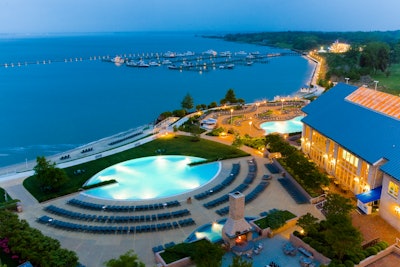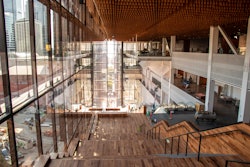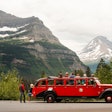
“Think outside the box.” It’s a mentality event and hospitality professionals have long leaned into—and during the struggles of the COVID-19 pandemic, have embraced more than ever.
While leisure travel has mostly returned to pre-pandemic levels, corporate groups are showing a bit more caution: According to an April 2022 report by the American Hotel & Lodging Association (AHLA) and Kalibri Labs, U.S. hotel business travel revenue is projected to be 23% below pre-pandemic levels this year.
But there are signs to feel confident about. A recent analysis—conducted by the San Diego State University School of Hospitality & Tourism Management on behalf of AHLA—found organizations that resume business travel and in-person meetings more quickly are likely to have a competitive edge.
To help incentivize companies to book in-person gatherings, hotels and other event venues have been thinking beyond the boardroom, leaning into unconventional experiences centered around team building, mental health, wellness, sustainability, and more. Here’s what we’re seeing now.
1. In-person gatherings are all about celebration right now.
Cari Ruppert—director of sales, marketing, and events at Maryland’s Hyatt Regency Chesapeake Bay Golf Resort, Spa and Marina—is seeing groups focused on celebrations and morale-building rather than strictly business. “Events are serving as the in-person environment for colleagues to connect and build relationships and strengthen their team,” she explains.
Ron Gorodesky—founder and CEO of Refined Hospitality, which operates Pennsylvania’s River House at Odette’s and New Jersey’s The Reeds at Shelter Haven—is seeing similar enthusiasm and interest, noting that “the flood gates opened” for group business around March 2022. “Guests are generally elated to resume meeting their colleagues face-to-face, have a change of pace to their everyday work structure, and explore new destinations and properties away from home,” he observes.
2. Meeting formats are changing.
When groups are focusing on business, the meetings look a bit different, adds Jessica Garcia, sales manager for L’Auberge de Sedona in Arizona. Clients are requesting “a more casual, open environment for their meetings, with soft seating and a living-room-style set up for presentations,” she says. “It is clear they are looking to make more meaningful connections to one another.”
Garcia also notes that groups are also interested in creative breakout moments, shifting from traditional snack and beverage breaks to more wellness-focused options. To address this, the hotel recently introduced its Power of Presence program, which includes unique options like sound baths, manifestation and intention cards, and an immersive “Drink Your Chakra” experience to help groups find balance in between meetings.
Ruppert observes similar shifts. “Groups are tending to include more collaborative work in their sessions,” she explains. “For example, we’re seeing less of one person standing on a stage for the duration of the meeting, and more of incorporating several people into the presentation or conversation.”
 L'Auberge de Sedona in Arizona recently launched its Power of Presence program, which includes unique options like sound baths (pictured), manifestation and intention cards, and an immersive “Drink Your Chakra” experience to help groups find balance in between meetings.Photo: Courtesy of L'Auberge de Sedona
L'Auberge de Sedona in Arizona recently launched its Power of Presence program, which includes unique options like sound baths (pictured), manifestation and intention cards, and an immersive “Drink Your Chakra” experience to help groups find balance in between meetings.Photo: Courtesy of L'Auberge de Sedona
3. Groups want memorable experiences that can bond teams.
For corporate groups that may not have gathered in person in years, team building is a crucial focus right now. “Companies are planning agendas with a lighter emphasis on meetings and allocating more time for team building, as well as off-site group activities such as hiking, Jeep tours, and star-gazing,” Garcia says.
The Hyatt Regency Chesapeake Bay, for instance, recently launched an updated menu of team-building experiences for groups, with activities ranging from archery and paddle-board yoga to scavenger hunts and even an on-site escape room.
Others are leaning into unconventional experiences that highlight the local culture. Hawaii's Four Seasons Resort Lanai, for example, recently debuted an on-property observatory and an “astro tourism” experience for guests, which features cultural advisors sharing ike kupuna (ancestral knowledge) of the celestial sphere.
Gorodesky is also observing interest in group programs that allow guests to explore the area’s natural beauty and culture. “Some of our most popular team-building exercises … include a bike tour and self-guided hike on the adjacent 60-mile towpath, as well as custom candle-making experiences with a local partner. We’re also seeing growing interest in out-of-the-box activities such as axe throwing.”
Adds Ruppert, “A lot of groups are looking for a ‘wow’ factor, whether it be decor, entertainment, food, or activities. This trend had died down a bit pre-pandemic but appears to have made a resurgence in popularity.”
4. Wellness experiences are having a moment.
All of our experts have observed a rising interest in wellness moments too. Canada’s Fairmont Vancouver Airport, for example, has launched the new “Fit on the Fly” suite that includes a Nordic-inspired, in-room gym complete with a stationary Peloton bike, FITBENCH equipment, and hydrotherapy shower and steamer.
“I’ve noticed that many of our wellness-focused activities are resonating with groups, such as yoga, stretching, 5K runs or walks, water aerobics, and Paddle Fit classes where attendees workout on stand-up paddle boards,” Ruppert explains.
But in 2022, employees and event attendees alike are also expecting wellness to go far beyond the physical—and venues are taking note. Kimpton Hotels & Restaurants, for example, has teamed up with online therapy company Talkspace to provide accessible mental health services to both travelers and employees. And Florida’s JW Marriott Marco Island Beach Resort has debuted the “Zen Den,” a designated quiet space for meeting attendees complete with dim lighting, chaise lounges, calming music, hot tea service, and a video wall playing scenes from nature.
 Several of JW Marriott’s properties have opened new edible, sustainable herb gardens designed by famed landscaper Lily Kwong. The JW Gardens allow the hotel’s chefs to grow and gather fruits, vegetables, and herbs to use in dishes and cocktails, and also act as a haven where guests can reconnect with nature through guided meditation, still-life painting classes, and more.Photo: Courtesy of JW Marriott
Several of JW Marriott’s properties have opened new edible, sustainable herb gardens designed by famed landscaper Lily Kwong. The JW Gardens allow the hotel’s chefs to grow and gather fruits, vegetables, and herbs to use in dishes and cocktails, and also act as a haven where guests can reconnect with nature through guided meditation, still-life painting classes, and more.Photo: Courtesy of JW Marriott
In another fun example, The Foundry Hotel in North Carolina has launched its unique Digital Detox Corporate Retreat package; guests don jackets designed to block cell signals and can enjoy forest bathing excursions, tarot readings, live sound journey meditation, and more.
5. Accessibility and sustainability are top of mind.
Venues have also been using lessons learned from the pandemic to become more accessible and inclusive, with properties like Kansas' Overland Park Convention Center opening a dedicated room—created by medical professionals—for attendees with sensory-processing issues who may feel overstimulated.
Meanwhile, West Virginia’s new Schoolhouse Hotel is billing itself as the first 100% ADA-compliant hotel in the world, with enhanced accessibility-focused features. It offers extensive accommodations for wheelchairs like low counters, roll-in showers, and a stage with an electric lift, plus synthetic grass for guide animals, lighting control to promote calming and visual aid, and more.
Guests are also looking for ramped-up sustainability efforts right now. The 200-room Inn at Laurel Point in Victoria, B.C., for example, has launched its new Carbon-Neutral Events Program, which helps event planners calculate their carbon footprint and offset travel and food-related emissions. And several of JW Marriott’s properties have opened new edible, sustainable herb gardens designed by famed landscaper Lily Kwong. The JW Gardens allow the hotel’s chefs to grow and gather fruits, vegetables, and herbs to use in dishes and cocktails, and also act as a haven where guests can reconnect with nature through guided meditation, still-life painting classes, and more.
7. Safety is still key.
Of course, the excitement to return in person doesn’t mean guests are neglecting safety, notes Garcia. “The majority of RFPs request information from the venue on safe-spacing for indoor meetings, easily accessible sanitization stations, and outdoor venues for meetings that would typically take place in the boardroom,” she observes.
 At L'Auberge de Sedona, Garcia says the majority of RFPs request information from the venue on outdoor venues for meetings that would typically take place in the boardroom.Photo: Courtesy of L'Auberge de Sedona
At L'Auberge de Sedona, Garcia says the majority of RFPs request information from the venue on outdoor venues for meetings that would typically take place in the boardroom.Photo: Courtesy of L'Auberge de Sedona
Ruppert advises that venue managers should always keep attendees in the loop on the latest COVID-19 guidelines—both to set expectations and to ensure the success of an event. “I also highly recommend sharing meeting and event agendas ahead of time. It’s imperative to make any and all information regarding your guest’s safety and well-being accessible,” she says, explaining that her property typically sends guests a “Know Before You Go” document with pertinent information.
“Companies tend to pursue business with people they like, and who make their lives easier by having the ability to anticipate their needs and demands,” Gorodesky sums up. “Establish trust from the beginning, and demonstrate your ability to be adaptable experts dedicated to ensuring their group experience will be customized to their specific needs.”
He adds, “While the convenience of technology and online business cannot be denied, we also have to acknowledge that human connections matter more than ever in this era.”



















